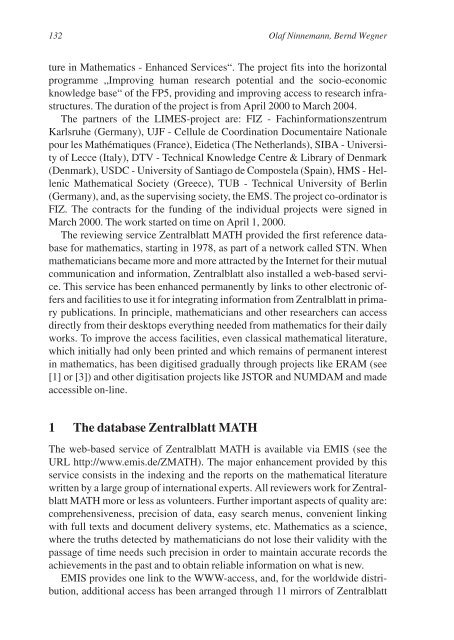Sharing Knowledge: Scientific Communication - SSOAR
Sharing Knowledge: Scientific Communication - SSOAR
Sharing Knowledge: Scientific Communication - SSOAR
Sie wollen auch ein ePaper? Erhöhen Sie die Reichweite Ihrer Titel.
YUMPU macht aus Druck-PDFs automatisch weboptimierte ePaper, die Google liebt.
132 Olaf Ninnemann, Bernd Wegner<br />
ture in Mathematics - Enhanced Services“. The project fits into the horizontal<br />
programme „Improving human research potential and the socio-economic<br />
knowledge base“ of the FP5, providing and improving access to research infrastructures.<br />
The duration of the project is from April 2000 to March 2004.<br />
The partners of the LIMES-project are: FIZ - Fachinformationszentrum<br />
Karlsruhe (Germany), UJF - Cellule de Coordination Documentaire Nationale<br />
pour les Mathématiques (France), Eidetica (The Netherlands), SIBA - University<br />
of Lecce (Italy), DTV - Technical <strong>Knowledge</strong> Centre & Library of Denmark<br />
(Denmark), USDC - University of Santiago de Compostela (Spain), HMS - Hellenic<br />
Mathematical Society (Greece), TUB - Technical University of Berlin<br />
(Germany), and, as the supervising society, the EMS. The project co-ordinator is<br />
FIZ. The contracts for the funding of the individual projects were signed in<br />
March 2000. The work started on time on April 1, 2000.<br />
The reviewing service Zentralblatt MATH provided the first reference database<br />
for mathematics, starting in 1978, as part of a network called STN. When<br />
mathematicians became more and more attracted by the Internet for their mutual<br />
communication and information, Zentralblatt also installed a web-based service.<br />
This service has been enhanced permanently by links to other electronic offers<br />
and facilities to use it for integrating information from Zentralblatt in primary<br />
publications. In principle, mathematicians and other researchers can access<br />
directly from their desktops everything needed from mathematics for their daily<br />
works. To improve the access facilities, even classical mathematical literature,<br />
which initially had only been printed and which remains of permanent interest<br />
in mathematics, has been digitised gradually through projects like ERAM (see<br />
[1] or [3]) and other digitisation projects like JSTOR and NUMDAM and made<br />
accessible on-line.<br />
1 The database Zentralblatt MATH<br />
The web-based service of Zentralblatt MATH is available via EMIS (see the<br />
URL http://www.emis.de/ZMATH). The major enhancement provided by this<br />
service consists in the indexing and the reports on the mathematical literature<br />
written by a large group of international experts. All reviewers work for Zentralblatt<br />
MATH more or less as volunteers. Further important aspects of quality are:<br />
comprehensiveness, precision of data, easy search menus, convenient linking<br />
with full texts and document delivery systems, etc. Mathematics as a science,<br />
where the truths detected by mathematicians do not lose their validity with the<br />
passage of time needs such precision in order to maintain accurate records the<br />
achievements in the past and to obtain reliable information on what is new.<br />
EMIS provides one link to the WWW-access, and, for the worldwide distribution,<br />
additional access has been arranged through 11 mirrors of Zentralblatt

















